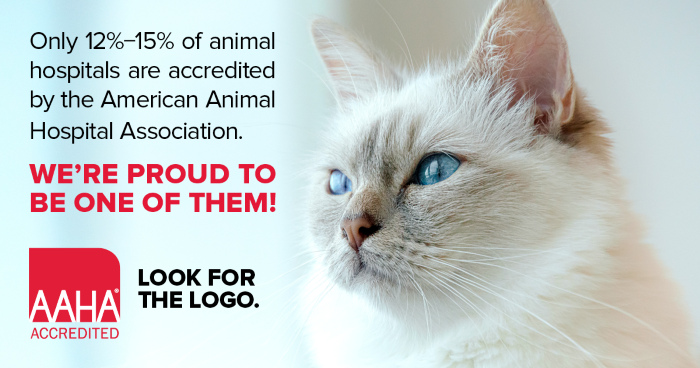We are happy to say this week we are re-accredited!
Why accreditation matters
Did you know that only 15% of veterinary hospitals have undergone the rigorous accreditation process? AAHA-accredited hospitals stand out by demonstrating their commitment to excellence and showcasing why accreditation matters.
Since 1933, AAHA’s ultimate goal is to help veterinary professionals provide exceptional care to pets and pet parents. Our efforts are to make your veterinarian’s life easier while elevating the care available to your pet. Because accreditation is voluntary, each hospital that chooses the AAHA path truly believes in the high standards upheld by our organization.
You can rest assured that AAHA-accredited veterinary practices and team members are driven to be the best and care about your pet’s health and well-being.
AAHA accreditation standards
To achieve AAHA accreditation, a veterinary hospital must meet or exceed hundreds of standards covering all aspects of veterinary care and business. These standards are continually updated to keep pace with advancements in veterinary medicine, ensuring that accredited hospitals remain at the forefront of the profession.
Veterinary hospitals must meet standards in the following categories:
- Anesthesia — Anesthesia standards are in place to ensure anesthesia is safe and effective for every pet.
- Dentistry — Ensure maximum safety and cleanliness and mandate that dental cleanings be performed only on anesthetized pets.
- Emergency and critical care — Govern how patients and clients are handled and treated during emergencies and hospitalizations.
- Human resources — Ensure the back end of the business runs as smoothly and efficiently as the front end of pet care services.
- Laboratory — Focus on sample collection and handling to maximize the chances of an accurate diagnosis.
- Medical records — Outline what to include in each patient’s medical records.
- Pain management — Outline how to assign pets a pain score and which drugs and drug combinations are best used in specific situations.
- Patient care — Covers a broad range of standards, including medical protocols and patient handling.
- Pharmacy — Ensure medications are stored and organized correctly and maintain proper records.
- Surgery — Focus heavily on safety and sterility.
Hospitals seeking their initial AAHA accreditation make significant changes and prepare for months to years for their first evaluation. If a veterinary hospital receives AAHA accreditation, it must continue to adapt to the profession’s evolving standards and pass re-evaluations every few years.
AAHA guidelines
AAHA-accredited hospitals also follow our guidelines, which are available to all veterinary professionals, regardless of their AAHA membership status. Industry experts create AAHA guidelines to cover popular and rapidly developing topics and help busy practitioners stay on top of cutting-edge care recommendations. Our goals in providing guidelines are to provide information on relevant topics that benefit the profession and assist veterinarians in making the best recommendations for their patients.

